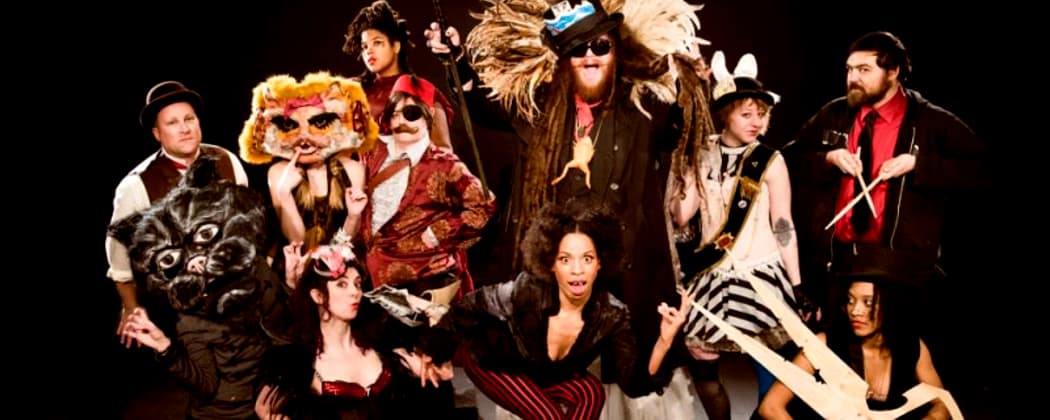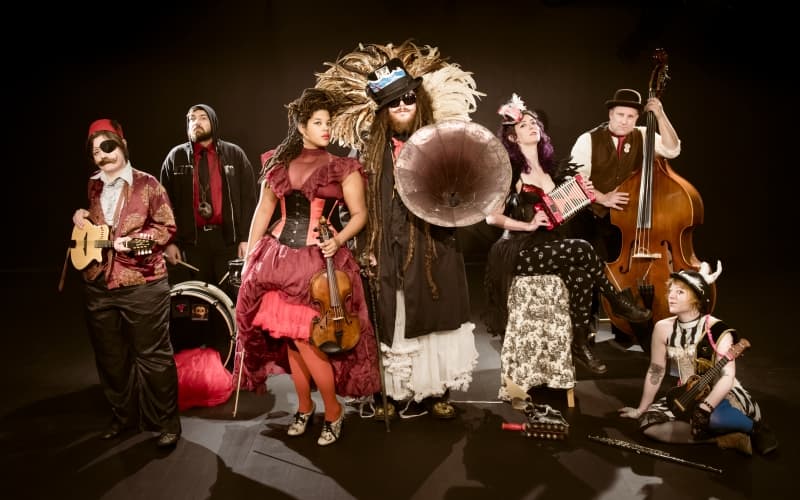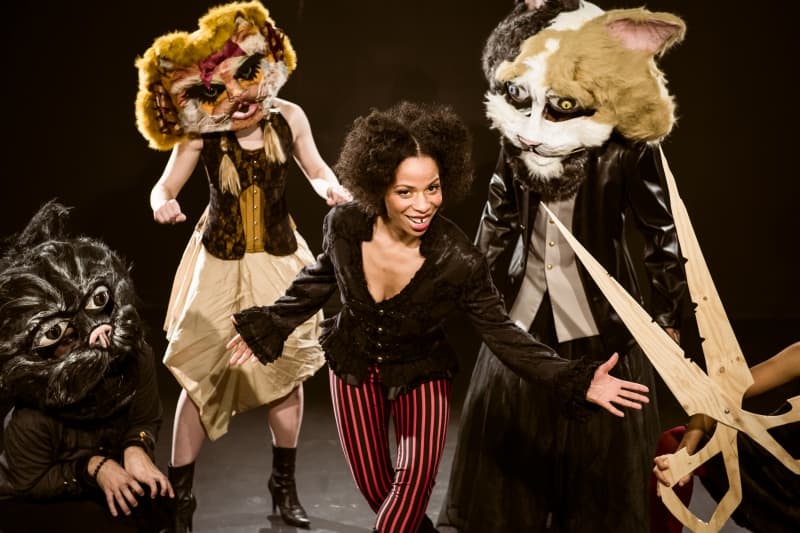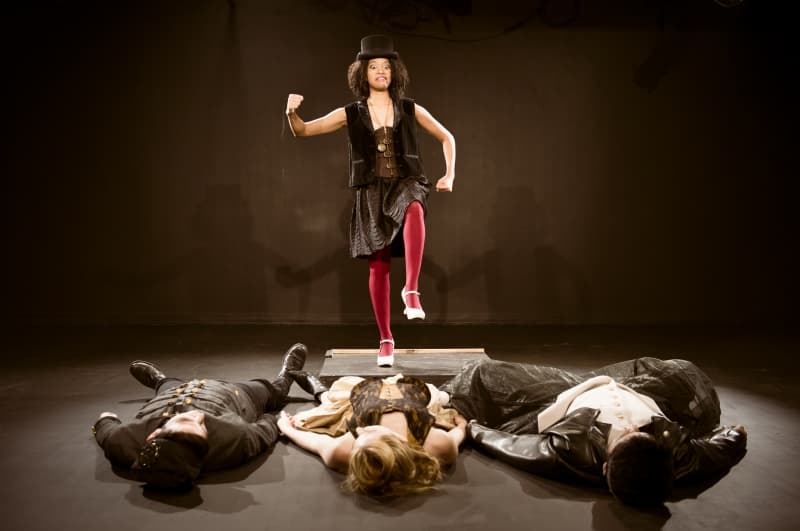Advertisement
The Collaboration That Sparked 'Shockheaded Peter'

For Company One, recreating “Shockheaded Peter” as it was originally produced would have proved impossible. The nightmarish musical, created by Julian Crouch and Phelim McDermott in 1998, wickedly critiques Heinrich Hoffmann’s “Struwwelpeter,” a collection of Victorian, Brothers Grimm-esque moral and cautionary tales originally written to scare the author’s son into behaving.
The challenge at hand is not found in the complexity of the source material, but how the play was built around the unique, unmatchable aesthetic of The Tiger Lillies, a British cult musical trio who are credited as the pioneers of Brechtian Punk Cabaret and can be recognized by Martyn Jacques’ trademark falsetto. Instead of attempting to fill the trio’s six shoes for the New England premiere, Company One decided to style it all their own. Integral to that was finding a collaborator as theatrical and particular — and perhaps peculiar — as The Tiger Lillies.
Enter Boston’s own steamcrunk seven-piece ensemble: Walter Sickert and the Army of Broken Toys.

“I knew right away that the collaborators on such a visual and experiential project make the thing or break it,” Shawn LaCount, artistic director of Company One, says of the play, which previews on March 6 before opening on the 7th. The play runs through April 4.
“It was kind of a no-brainer. The people who came to mind immediately were the Army of Broken Toys. They are a band that understands what theater is, which is really important, because we weren’t asking them to sit quietly behind a scrim and play like you would in a musical. We were asking them to lend their aesthetic to take over the piece — the primary artistic collaborator.”
As LaCount sought the rights to “Shockheaded Peter” with the Army of Broken Toys in mind, the band had their eyes on Company One, too. Last spring, after attending a performance of Annie Baker’s Pulitzer Prize-winning “The Flick” at Suffolk’s Modern Theatre, home also to “Peter,” band member Edrie took to Twitter. LaCount recalls the tweet from @armyoftoys: “Loved the piece and would love to work together sometime.”
“I tweeted back right away,” says LaCount with a laugh. “‘Funny you should say that …’”
More surprising than the fortuitous timing is the special relationship the Army of Broken Toys has with the material and The Tiger Lillies. After graduating high school, on a trip of self-discovery and shenanigans driving around the country in his Cadillac, Walter Sickert says he heard about an ongoing production of “Shockheaded Peter” and sought it out. He saw two performances on back-to-back nights.
“I had never seen anything that was so grotesque and beautiful,” says Sickert on the phone during one of the many blizzards that have hindered, but not halted rehearsals. “It married a lot of the things I loved when I was a kid. The Jim Henson-style puppets and the feeling that you’re seeing something you’re too young to see. You know, you stayed up late to see the horror movie that’s on TV past your bedtime.”

“It also set me off on a path of making art and music that drew on the feelings of childhood and nightmares, and exploring the far off regions of imagination.”
Years later, squatting in a barn in New Hampshire with the memory as a quasi-mood board (and equipped with a heater, generator and four-track recorder), Sickert laid down a few tracks that would become the foundation of Walter Sickert and the Army of Broken Toys -- a sound he now describes as “a Johnny Cash and Parliament-Funkadelic meets Nine Inch Nails and who-the-hell-knows.”
With no other band members and an overcompensating name, Sickert met Edrie, a local musician, artist and arts promoter, and the solo project become a duo. After only a handful of nightclub gigs around the city, the pair were offered the chance to drive out to Los Angeles to be the opener at the Royce Hall, a 1,800-person capacity venue. They would be opening for none other than The Tiger Lillies, a professional encounter that would evolve into a friendship.
Since then, the Army has tumbleweeded into a force of seven -- picking up TJ Horn (percussion), Rachel Jayson (viola), jojo Lazar (ukele, flute), Mike Leggio (double bass) and Meff (mandolin, guitar, mustache). The mix of self- and classically-trained musicians each offer their own creative flair to the collective that aims to “live outside the box of what’s expected of a rock band” and consistently seek out new performance adventures. The band continuously puts out new music, and has released three (soon to be four) official albums as a full band. In 2012, they worked with Liars & Believers (LAB) on their original SteamCRUNK musical, “28 Seeds” for a sold-out run at the Boston Center for The Arts. Sickert is also currently scoring his first feature film, "Some Freaks," for director Ian McDonald and scoring two “Alice” shorts for American McGee.
While they often invite guest musicians and artists to join them on-stage, Sickert says the current group is very much a family and has likely found its equilibrium, its permanent form. But he qualifies it, offering the quip, “Never say never.”
For this production, the Army of Broken Toys has invited Boston-based performer Jen Kenneally to fill in for Edrie onstage as she and Sickert welcome their first child. Edrie, who is listed as The Wrangler in the "Shockheaded Peter" playbill, maintains her role as a driving force of the production. The baby, Wednesday, was expected to arrive during the middle of the run, but the family saw an early delivery and welcomed her on Feb. 23.
"In spite of Wednesday being early, the show must go on," Edrie writes in a e-mail on the day she returns home after giving birth. “Ironically, she was born on the one true day off Walter had before opening night!"
She continues: "I'm heavily involved in the production and have been doing as much as I can to make sure opening night is spectacular! Wednesday has been listening to the songs for months! I'm sure she is early because she wanted to experience "Shockheaded Peter" [first] hand. If everyone is up to it, she'll be there opening night!"
In an earlier correspondence, she says of Wednesday’s arrival, “That's the other big project Walter and I were working on.”
Given the band’s interest in the material and love of collaboration and cross-pollination in the arts — an interest shared and practiced by Company One as a way to expand their radically-inclusive audience reach — joining forces was as much a “no-brainer” for them as it was for Shawn LaCount and the rest of the crew.
“Yes, yes, yes,” would be Sickert’s answer.

Of course, not everyone involved in the production is on board solely because they’re drawn to the dark, twisted material as if they’re being beckoned home by the mothership. Alexandria King, who plays the MC (a role previously played only by men) from atop platform pleather knee-high boots (and occasionally stilts), says she’s scared of horror. She playfully recalls her father’s notorious scary stories — mimicking his deep baritone — that led to the aversion. But King, who also starred in Company One’s “Splendor,” welcomes the challenge to star in a play unlike any she has ever acted in, and appreciates what one finds mixed into the madness of “Shockheaded Peter.”
“Looking at this script, I knew it was going to be really fun to put on,” says King, “but it has a really important message embedded in it, which is, what are we doing to our children as parents and as a society and what effect does that, in turn, have on the parent and society? How is our relationship with the youth hurting us as a people? I thought that was amazingly important -- as a mother and a teacher.”
Played out in vignettes under a larger umbrella story of a family who rejects their own child and banishes him to live under the floorboards -- the titular Peter -- the musical’s anecdotal tales of thumb-sucking, playing with matches and shooting guns are also explorations of our society’s relationship with creativity and the individual. These themes not only fit neatly into Company One’s season, sandwiched between “The Displaced Hindu God’s Trilogy” and “Edith Can Shoot Things And Hit Them” (a collaboration with Huntington Theatre Company), they also resonate deeply with director Steven Bogart.
“One of the things that really emerged for me when I started really thinking about the piece and digging into it was the idea of the abandoned child within all of us and how in our culture in different kinds of situations -- whether it’s in education in schools, or the way we treat artists in the world, et cetera -- we often crush children’s imaginations and we crush their impulses and their desire to experiment and their desire to go out and adventure,” says Bogart. “We get so frightened as adults and parents and teachers and administrators that we often put roadblocks in the way of creative development or even just nurturing a whole child.”
Of working with the band, Bogart says, “They’re a very mobile band. The individual musicians often move out and perform, they don’t all just sit onstage. They come out into the audience. So the challenge that we have is how to integrate that idea into the staging of the individual stories, plus the main story, and how to use the band, the way they perform, in an effective way, that allows for the piece to still hold it’s own, for the piece not to just be a band number.”
During a recent open rehearsal at the Modern Theatre, human screams and cat yowls carried from the stage into the lobby and harmonized with the howling winds coursing down Washington Street. The noises of Boston's abominable winter would’ve been drowned out if Walter Sickert and the Army of Broken Toys picked up their instruments and released their dynamic full-bodied sound, but that day the band acted as audience while Sickert’s compositions played quietly from a stereo — 11 tracks that he hopes evoke a mood of "Charlie and The Chocolate Factory" meets "Hellraiser." The music, lyrics and the intermittent monologuing from King’s MC provided the tempo and cues for the cast's pantomiming and puppetry, as the seven musicians looked on, their stations on tiered scaffolding empty, and imagined where they fit physically, not just sonically, into this beloved, ghoulish play.
Susanna Jackson's writing has been featured in Art New England, Boston Globe and DigBoston. You can find her on Twitter @suedoesnttweet.
